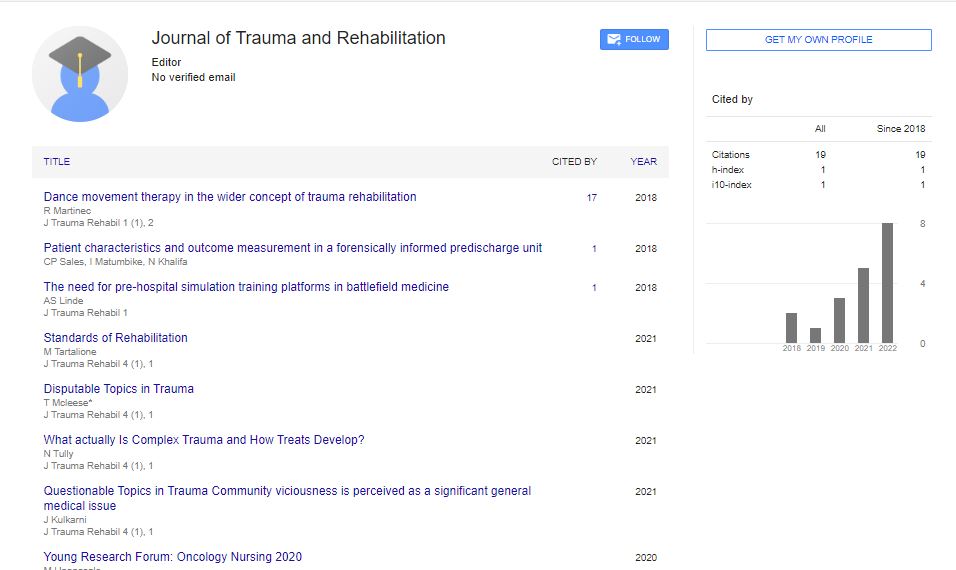Perspective, J Trauma Rehabil Vol: 6 Issue: 4
An Integrated Approach to Suicidal Trauma Treatment
Amaya Eamonn*
1Department of Psychiatry, University of Colorado Anschutz Medical Campus, Colorado, United States of America
*Corresponding Author: Amaya Eamonn,
Department of Psychiatry, University of
Colorado Anschutz Medical Campus, Colorado, United States of America
E-mail: amaeamo@ucam.gov
Received date: 24 November, 2023, Manuscript No. JTR-24-127956;
Editor assigned date: 27 November, 2023, PreQC No. JTR-24-127956 (PQ);
Reviewed date: 11 December, 2023, QC No. JTR-24-127956;
Revised date: 18 December, 2023, Manuscript No. JTR-24-127956 (R);
Published date: 26 December, 2023, DOI: 10.4172/Jtr.1000141
Citation: Eamonn A (2023) An Integrated Approach to Suicidal Trauma Treatment. J Trauma Rehabil 6:4.
Description
Suicidal trauma is a deeply complex and dreaded experience that requires a comprehensive and integrated approach to treatment. Beyond the contemplation of suicide lies a multifaceted web of emotional, psychological and social challenges that demand a nuanced strategy for intervention and recovery. At its core, an integrated approach to suicidal trauma treatment recognizes that the emotional landscape of individuals grappling with suicidal thoughts is marked by profound despair, isolation and powerlessness. The first step involves developing a therapeutic alliance that fosters trust and provides a safe space for individuals to express their emotions without judgment. This forms the foundation upon which various therapeutic modalities can be woven together to address the unique needs of each individual. One important aspect of an integrated approach is the recognition of the role of mental health disorders in suicidal trauma. Conditions such as depression, bipolar disorder or post-traumatic stress disorder can significantly amplify emotional distress and contribute to the risk of suicidal thoughts.
Comprehensive psychiatric assessments are conducted to understand the underlying mental health conditions and guide the selection of appropriate medications when necessary. The integration of pharmacological interventions, under the supervision of mental health professionals, complements psychotherapeutic approaches to develop a comprehensive treatment strategy. Psychotherapy, particularly evidence-based modalities such as Cognitive-Behavioral Therapy (CBT) and Dialectical Behavior Therapy (DBT), plays a central role in addressing the emotional and psychological dimensions of suicidal trauma. CBT focuses on identifying and challenging negative thought patterns, promoting cognitive restructuring and adaptive techniques. DBT emphasizes mindfulness, emotional regulation, interpersonal effectiveness and distress tolerance, providing individuals with practical tools to navigate their emotional challenges. An integrated approach also recognizes the significance of social support in the treatment of suicidal trauma. Social isolation often accompanies this form of trauma, reinforcing feelings of alienation and despair. Therapists work collaboratively with individuals to rebuild and strengthen their social connections.
Family therapy plays a vital role, involving the loved ones of individuals dealing with suicidal trauma. Addressing these emotions within the therapeutic setting helps family members understand the complexities of suicidal trauma and equips them with tools to provide support. Family therapy also fosters open communication, breaking down the barriers that can hinder discussions about mental health and suicide. The aftermath of suicidal trauma extends beyond the individual to impact relationships, families and broader communities. Therefore, an integrated approach involves community-based initiatives that contribute to destigmatization, mental health education and accessible resources. These initiatives develop a culture that supports open dialogue, encourages help-seeking behavior, and reduces societal barriers to mental health care. Preventing suicidal trauma necessitates proactive efforts on both individual and societal levels. Mental health awareness campaigns, education programs and destigmatization efforts are vital components of an integrated approach.
Conclusion
By fostering an environment where individuals feel empowered to seek help without fear of judgment, the broader community becomes an active participant in the collective effort to prevent and address suicidal trauma. An integrated approach to suicidal trauma treatment acknowledges the complex interaction of factors contributing to an individual's distress. By combining the psychiatric interventions, evidence-based psychotherapies, social support mechanisms and community engagement, this approach fulfills the needs in a comprehensive manner for individuals who are dealing with suicidal trauma. It recognizes that treatment is not a complex one-size-fits-all endeavor but rather a customized and compassionate expedition towards recovery, healing the wounds of despair and fostering a renewed feeling of optimism for a brighter future.
 Spanish
Spanish  Chinese
Chinese  Russian
Russian  German
German  French
French  Japanese
Japanese  Portuguese
Portuguese  Hindi
Hindi 